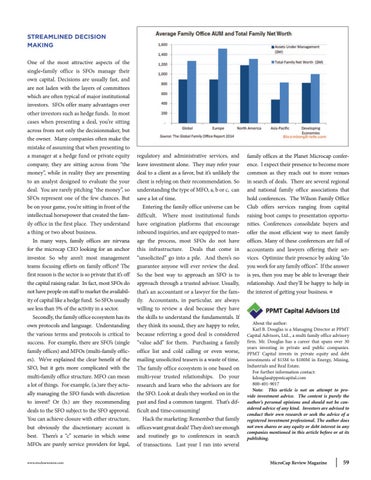sTreamlIneD DeCIsIon makIng One of the most attractive aspects of the single-family office is SFOs manage their own capital. Decisions are usually fast, and are not laden with the layers of committees which are often typical of major institutional investors. SFOs offer many advantages over other investors such as hedge funds. In most cases when presenting a deal, you’re sitting across from not only the decisionmaker, but the owner. Many companies often make the mistake of assuming that when presenting to a manager at a hedge fund or private equity company, they are sitting across from “the money”, while in reality they are presenting to an analyst designed to evaluate the your deal. You are rarely pitching “the money”, so SFOs represent one of the few chances. But be on your game, you’re sitting in front of the intellectual horsepower that created the family office in the first place. They understand a thing or two about business. In many ways, family offices are nirvana for the microcap CEO looking for an anchor investor. So why aren’t most management teams focusing efforts on family offices? The first reason is the sector is so private that it’s off the capital raising radar. In fact, most SFOs do not have people on staff to market the availability of capital like a hedge fund. So SFOs usually see less than 5% of the activity in a sector. Secondly, the family office ecosystem has its own protocols and language. Understanding the various terms and protocols is critical to success. For example, there are SFO’s (single family offices) and MFOs (multi-family offices). We’ve explained the clear benefit of the SFO, but it gets more complicated with the multi-family office structure. MFO can mean a lot of things. For example, (a.)are they actually managing the SFO funds with discretion to invest? Or (b.) are they recommending deals to the SFO subject to the SFO approval. You can achieve closure with either structure, but obviously the discretionary account is best. There’s a “c” scenario in which some MFOs are purely service providers for legal, www.stocknewsnow.com
regulatory and administrative services, and leave investment alone. They may refer your deal to a client as a favor, but it’s unlikely the client is relying on their recommendation. So understanding the type of MFO, a, b or c, can save a lot of time. Entering the family office universe can be difficult. Where most institutional funds have origination platforms that encourage inbound inquiries, and are equipped to manage the process, most SFOs do not have this infrastructure. Deals that come in “unsolicited” go into a pile. And there’s no guarantee anyone will ever review the deal. So the best way to approach an SFO is to approach through a trusted advisor. Usually, that’s an accountant or a lawyer for the family. Accountants, in particular, are always willing to review a deal because they have the skills to understand the fundamentals. If they think its sound, they are happy to refer, because referring a good deal is considered “value add” for them. Purchasing a family office list and cold calling or even worse, mailing unsolicited teasers is a waste of time. The family office ecosystem is one based on multi-year trusted relationships. Do your research and learn who the advisors are for the SFO. Look at deals they worked on in the past and find a common tangent. That’s difficult and time-consuming! Hack the marketing: Remember that family offices want great deals! They don’t see enough and routinely go to conferences in search of transactions. Last year I ran into several
family offices at the Planet Microcap conference. I expect their presence to become more common as they reach out to more venues in search of deals. There are several regional and national family office associations that hold conferences. The Wilson Family Office Club offers services ranging from capital raising boot camps to presentation opportunities. Conferences consolidate buyers and offer the most efficient way to meet family offices. Many of these conferences are full of accountants and lawyers offering their services. Optimize their presence by asking “do you work for any family offices”. If the answer is yes, then you may be able to leverage their relationship. And they’ll be happy to help in the interest of getting your business. n
About the author: Karl B. Douglas is a Managing Director at PPMT Capital Advisors, Ltd.., a multi family office advisory firm. Mr. Douglas has a career that spans over 30 years investing in private and public companies. PPMT Capital invests in private equity and debt investments of $15M to $100M in Energy, Mining, Industrials and Real Estate. For further information contact: kdouglas@ppmtcapital.com 800-401-9017 Note: This article is not an attempt to provide investment advice. The content is purely the author’s personal opinions and should not be considered advice of any kind. Investors are advised to conduct their own research or seek the advice of a registered investment professional. The author does not own shares or any equity or debt interest in any companies mentioned in this article before or at its publishing.
MicroCap Review Magazine
59
